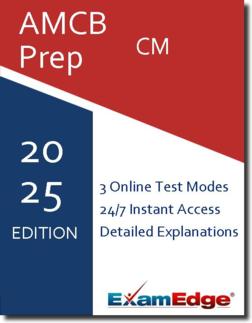AMCB CM (CM) Practice Tests & Test Prep by Exam Edge - Test Reviews
Based on 28 Reviews
- Real Exam Simulation: Timed questions and matching content build comfort for your AMCB CM test day.
- Instant, 24/7 Access: Web-based AMCB Certified Midwife practice exams with no software needed.
- Clear Explanations: Step-by-step answers and explanations for your AMCB exam to strengthen understanding.
- Boosted Confidence: Reduces anxiety and improves test-taking skills to ace your AMCB Certified Midwife (CM).

AMCB CM (CM) Practice Tests & Test Prep by Exam Edge - Review
AMCB Certified Midwife - Reviews
Excellent
Based on
140
reviews
“ Thanks for all of your help. I took my boards today and passed!!! This is the only prep I found that was actually like the real exam. After failing twice I was getting discouraged. Thanks again! This was a true life saver for me
Sarah , Arizona
“ I just wanted to reach out to say, Thank you. I passed my ACNM boards today on the first try after being a year past graduation with no interaction with the field. I have had a lot going on and your program was exactly what I needed to stimulate the forgotten information
Nedra, Elfer, FL
See why our users from 154 countries love us for their exam prep! Including 28 reviews for the AMCB CM exam.
Exam Edge is an Industry Leader in Online Test Prep. We work with our Institutional Partners to offer a wide array of practice tests that will help you prepare for your big exam. No Matter how niche field of interest might be, were here to help you prepare for your test day.
| 2.8M | 4.5M | |
| Users | Tests Taken | |
| 100K | 19 | |
| Unique Exams | Years in Business | |


